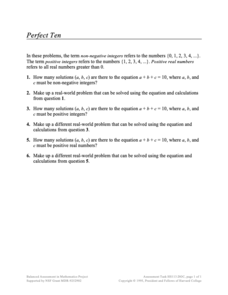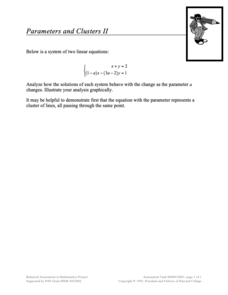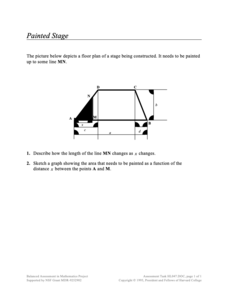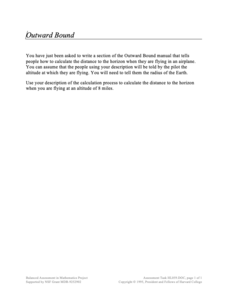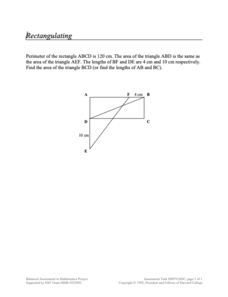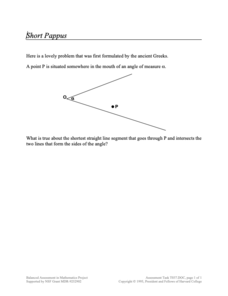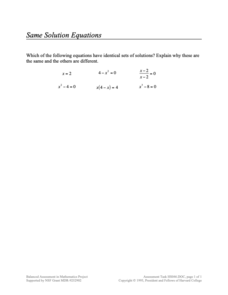Concord Consortium
Proportional Representation
Sometimes the solution is all a matter of perspective. The short assessment task presents a problem to pupils that requires them to make sense of a diagram. Once learners see two similar triangles, the rest of the solution is solving a...
Concord Consortium
Perfect Ten
How many ways can you make 10? Class members tackle three problems to find all possible ways three numbers add to be 10. The first is with positive integers, secondly with non-negative integers, and finally with real numbers. Pupils also...
Concord Consortium
Parameters and Clusters II
Let's give parameters a second try. Scholars take a second look at a system of linear equations that involve a parameter. Using their knowledge of solutions of systems of linear equations, learners describe the solution to the system as...
Concord Consortium
Parameters and Clusters I
Chase the traveling solution. Pupils analyze the solutions to a system of linear equations as the parameter in one equation changes. Scholars then use graphs to illustrate their analyses.
Concord Consortium
Painted Stage
Find the area as it slides. Pupils derive an equation to find the painted area of a section of a trapezoidal-shaped stage The section depends upon the sliding distance the edge of the painted section is from a vertex of the trapezoid....
Concord Consortium
Rational and Not So Rational Functions
Do not cross the line while graphing. Provided with several coordinate axes along with asymptotes, pupils determine two functions that will fit the given restrictions. Scholars then determine other geometrical relationships of asymptotes...
Concord Consortium
Outward Bound
Just how far can I see? The short assessment question uses the Pythagorean Theorem to find the distance to the horizon from a given altitude. Scholars use the relationship of a tangent segment and the radius of a circle to find the...
Concord Consortium
Poly II
Create polynomials with specific values. The task consists of writing three polynomial functions that evaluate to specific values for any given number. Scholars first find a polynomial that evaluates to one for a given value, then a...
Concord Consortium
Quadratic Reflections
Reflect upon the graphs of quadratic functions. Given a quadratic function to graph, pupils determine whether the graph after a horizontal and vertical reflection is still a function. The final two questions ask scholars to describe a...
Concord Consortium
Rectangulating
Use rectangles to find distances. Given a rectangle and three associated triangles, pupils determine the area of the triangles. Scholars know the three triangles have equal areas along with the perimeter of the rectangle and two other...
Concord Consortium
Petit Fours
Four 4s represent the counting numbers. Pupils attempt to write equivalent expressions to as many counting numbers as possible using only four 4s. Scholars then determine whether the same feat is possible using only three 3s.
Concord Consortium
Sloppy Student II
Doesn't trying two substitutions prove it is equal? Individuals analyze a given polynomial division problem to determine whether the answer is correct. Classmates continue to determine what values to use that show the answer and the...
Concord Consortium
Short Pappus
It's all Greek to me. Scholars work a task that Greeks first formulated for an ancient math challenge. Provided with an angle and a point inside the angle, scholars develop conjectures about what is true about the shortest line segment...
Concord Consortium
Sine Solution
How many times can eager mathematicians catch the waves? Pupils find the solutions of three different trigonometric equations. They then determine the effect of the slope of a line that intersects a trigonometric function and the number...
Concord Consortium
Shooting Arrows through a Hoop
The slope makes a difference. Given an equation of a circle and point, scholars determine the relationship of the slope of a line through the point and the number of intersections with the circle. After graphing the relationship, pupils...
Concord Consortium
Sharp-Ness of Bends
Define the sharpest in the group. Given a section of a trail map, pupils determine a method to measure the sharpness of each turn in the path. Individuals then determine what modifications to their formulas to make to find the sharpness...
Concord Consortium
Same Solution Equations
Group equations by their solutions. Given six different equations, pupils determine which have the same solutions. Scholars explain why some are the same and some are different.
University of Wisconsin
Don Quixote in Wisconsin
Are you looking for background information on Cervantes and his Don Quixote? How about a study guide and discussion questions or project ideas? Even journal prompts, tests, and quizzes? A 98-page teaching guide simplifies the quest with...
Curated OER
Time Capsule: Oral Presentation
A great way to gain proficiency when learning a new language is to prepare an oral presentation. In this foreign language lesson, pairs collaborate to develop a Time Capsule which they present to their class using their target language.
Curated OER
My Daily Routine
Foreign language learners work in pairs to translate the daily routine of celebrities or everyday people, presented in daily planner format, into English. They then illustrate and record their own daily routines in storyboard (film...
Curated OER
Conversations about childhood
Encourage your class to discuss their childhood with other classmates using the six questions listed here. After sharing their answers, learners write a paragraph detailing general information about their childhood. This plan is designed...
Curated OER
Writing a News Story
Students practice using their target language by writing a news article. In this foreign language writing lesson, students create a fictional "hero" in their city which they write a fictional news article about in their new language....
Curated OER
Classified Advertisements: Target Language Practice
Foreign language learners decipher the meanings of classified ads in the target language. They investigate a large collage created by the teacher of foreign language advertisements and discuss the content with classmates. Then they...
Curated OER
Learning about Fibonacci
In this learning about Fibonacci worksheet, students read about Leonardo Fibonacci and his contribution to mathematics, then study the pattern of Fibonacci numbers, in math and in nature.
Other popular searches
- Arabic Poetry
- Arabic Calligraphy
- Arabic Influence
- Multicultural Music Arabic
- Arabic Numbers
- Arabic Language
- Arabic Numerals
- Arabic Architecture
- Arabic Influence in Spain
- Arabic Foods
- Arabic Poetry for Teachers
- Arabic Poetry for Students



